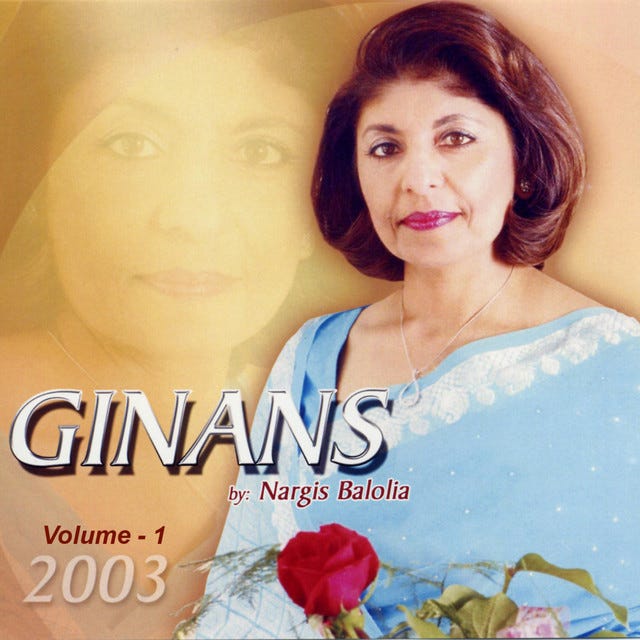EVERY GENRE PROJECT - November 19 - Ginan
Genre of the Day - Ginan
Album of the Day - Ginans (Vol. 1) by Nargis Balolia (2003)
It’s been a while in this column since I got the chance to rag on the British Empire, but trust that musical history across the world provides ample opportunities to do so as it intersects with its many disgraceful blunders. One of its most inarguably shameful moments was how South Asia, a region with hundreds of years of shared history, was torn asunder by a messy pullout and schism in which around 3 million people died in the chaos. The division of India and Pakistan into religiously distinct states was in part a legacy of divides exploited by the British Raj for political purposes. Nonetheless, there remain a plurality of religious communities within each country, each with intangible cultures within the wider fabric to explore. Ginan puts the spotlight on a shared regional musical history, while delving into it manifests in a particular religious context.
Ginan shares a deep root with the Greek gnosis, which translates to knowledge; it informs a genre that is based on a deeply mystical recitation of the Quran. The Ismaili branch of Shia Islam counts a few million adherents worldwide, divided into further subsects and pockets. Followers look to Imam Aga Khan, who traces back his lineage to the prophet Muhammad, for spiritual leadership as the only division of Shia Islam with a hereditary imam. In India, these disparate communities mostly concentrated in Gujarat are united by the musical expression ginan that traces back almost as many centuries as this lineage and has anchored communities as a reminder of endurance and faith amidst a history of discrimination by both Sunni and Hindu political establishments.
To read the hundreds of traditional texts that inform Ismailism is one spiritually nourishing endeavor, but sound and the voice transmit the deeper and more esoteric nature particular to the sect with understandings that can’t be wholly described. Ginans typically employ the musical structures and instrumentation of Indian traditional forms, with the long and contemplative essence of dhrupad as a particular correlate. Ginans draw from centuries of poems and hymns composed by preachers over time to spread Ismaili heritage and ideas across a range of languages and compositional techniques. A meticulously maintained database by the University of Saskatchewan demonstrates the flexibility of the reciter to interpret a particular ginan as they bring these hymns into the present moment and draw faithful listeners in.
Nargis Balolia maintains an excellent, succinctive website and and even more finely appointed, resplendent in her interpretations of Gujarati-language ginan standards that carry profound spiritual weight. Her melismatic style illustrated in “Aaye Rahem Raheman” is clearly steeped in a deep, cross-faith musical tradition, surrounding her voice with a certain golden weightlessness. Slightly different instrumental flourishes elsewhere speak to the wider Muslim musical world as in the descending strings of “Pir Naachi Ne Kanthe Ginan Re,” a ginan whose lyrics implore: “Maintain patience and trust in your hearts!” While grounding listeners in religious faith, it also speaks to hope for a future marked not by interreligious tension but by harmony and respect that matches the joy of closer “Evi Garbi Sampuraan Saar.”




